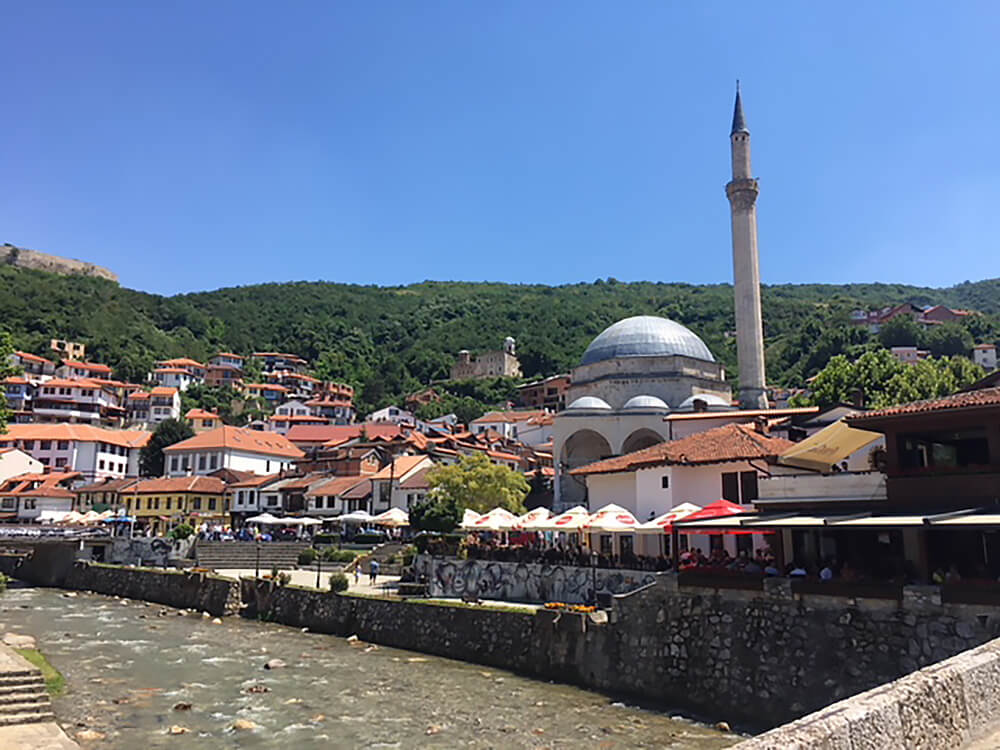Shane Desselle shares his experiences creating an assessment center at the University of Pristina in Kosovo through the Fulbright Specialist Program.
By Athena Ponushis
Dr. Shane Desselle, professor at Touro University California College of Pharmacy and former AACP board member, has seen a push around the globe for pharmacists to take a more prominent role in public health and be more directly involved with patient care. Serving as a Fulbright Specialist Scholar in Kosovo over 19 days last July, Desselle helped inform the creation of an assessment center at the University of Pristina. He found his Fulbright experience to be exhilarating. As he took in the culture and savored the food, he knew he wanted to share his story so that in the midst of this global move to elevate pharmacy practice and education, other pharmacy scholars in the United States might take advantage of the Fulbright Specialist program, make an impact abroad and bring insights back home.
The opportunity for cultural and scholarly exchange has always appealed to Desselle, but he did not see how he could participate in the Fulbright Program, leaving his family and work for several months. Continually hearing about the compelling work Fulbright scholars were doing, he explored Fulbright further and found the specialist program, which allows academics and established professionals to engage in project-based exchanges with host institutions around the globe for two to six weeks. Desselle thought he could do that. “To be able to travel and share scholarly discourse and scholarly ideas with people in similar disciplines as mine in other parts of the world, while getting to experience their food and culture, learn some things about how their government works and how pharmacy works in that particular country, as well as how things are financed regarding medication use systems and policy, is extraordinarily compelling,” Desselle said.
Though it’s recommended that applicants develop a relationship with a potential host, Desselle did not. He built his application around his strengths: being a scholar with expertise in assessment and development of mentorship programs, as well as being productive in writing, as the founding editor-in-chief of the peer-reviewed journal Research in Social and Administrative Pharmacy. During a fortuitous conversation with a fellow academic abroad, Dr. Kreshnik Hoti, vice dean for the Faculty of Medicine at the University of Pristina, Desselle casually mentioned being on the Fulbright roster. The University of Pristina was looking for someone with experience in assessment who could help the school be more productive in scholarship of teaching and learning. Hoti submitted an application for Desselle’s services and Desselle was off to Kosovo.
Building an Assessment Culture
The University of Pristina is the largest university in Kosovo. The flagship university of a developing country, it’s almost entirely funded by the government. Looking to become more elite and join the upper echelon of European institutions, Pristina leaders knew they had to develop an assessment center and improve their assessment of student learning outcomes. They decided that bringing in someone from the outside would be advantageous.
The focus of Desselle’s assignment was to inform the creation of a Center for Assessment for the Faculty of Medicine at the University of Pristina (Faculty of Medicine being akin to a College of Medicine that includes the schools of medicine, pharmacy, dentistry and other allied health sciences). Once the Faculty of Medicine got the assessment center up and running, it would serve as a model for other faculty/colleges to do the same. Leadership supported the project, envisioning the eventual establishment of an assessment center at the university level. During Desselle’s first few days there, he met with the rector (basically the president or chancellor of the university) as well as with all the vice rectors and deans of other faculties. This allowed Desselle to see what was currently in place at the university and showed him how much they supported his work.

